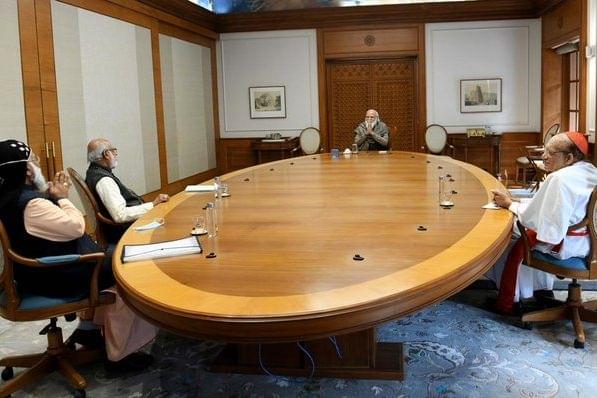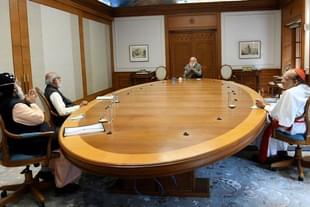News Brief
Kerala 2021: The Electoral Significance Of PM Modi’s Meeting With Catholic Bishops
M R Subramani
Jan 20, 2021, 03:46 PM | Updated 03:46 PM IST
Save & read from anywhere!
Bookmark stories for easy access on any device or the Swarajya app.


Prime Minister Narendra Modi yesterday (19 January) met three Catholic bishops as part of what could be construed as the Bharatiya Janata Party's (BJP’s) efforts to reach out to the Christian community ahead of the assembly elections in Kerala.
Modi met Cardinal Oswald Gracias of the Latin-rite Church, Mumbai, Cardinal George Alencherry, Major Archbishop of the Syro-Malabar Church, and Cardinal Baselios Cleemis, Major Archbishop of the Syro-Malankara Church — both Kerala — in his office.
This comes on the heels of his meeting with Kerala church factions to end the decades-long dispute between Orthodox and Jacobite groups of Malankara Orthodox Church.
Though the three bishops said they did not discuss politics, they had made three tricky requests, two of which the Prime Minister has agreed to consider, while leaving the third to the law taking its course.
One of the requests Modi agreed to consider was inviting Pope Francis to India.
The Pope had expressed his interest to visit India in 2017 but the Union government chose to keep quiet then. The Pope then chose to visit Myanmar and Bangladesh.
The Modi government has been resisting pressure to invite the Pope since 2014.
“A papal visit is long overdue. We expect a decision from the Prime Minister soon," Cardinal Alencherry told the media after meeting Modi.
The other request that Modi agreed to consider was an equitable distribution of social welfare funds meant for religious minorities such as Muslims and Christians.
This is in view of Muslims, who are the largest minority community among India’s 1.4 billion people, getting over 80 per cent of the funds.
The third request was the release of Jesuit priest Father Stan Swamy, who is imprisoned in Maharashtra’s Taloja Jail.
The Prime Minister told the bishops that he would not be able to help since the National Investigation Agency (NIA) was handling the case.
“He (the PM) is aware of the problem, but he said that the government does not want to interfere in the functioning of the agency,” said Cardinal Oswald Gracias, who is also the president of the Catholic Bishops’ Conference of India (CBCI).
“The Prime Minister expressed his inability to intervene in the issue of law. The solution in Stan Swamy’s case can only come from the investigating agencies, the Prime Minister said,” Cardinal Alencherry said, adding that Modi had told them that the case had to go through normal channels.
Tribal rights activist Father Stan Swamy was arrested on 8 October last year for his alleged involvement in Bhima Koregaon violence on 1 January 2018 and for participating in Elgar Parishad on 31 December 2017 to commemorate the 200th anniversary of the Battle of Bhima Koregaon.
Last month, the Prime Minister met the Jacobite and Orthodox factions of the Malankara Orthodox Syrian Church, who are locked in a dispute over the control of about 1,000 churches and properties between them. The dispute dates back to 1973.
These efforts are viewed by political observers as the BJP’s efforts to reach out to the Christian community in Kerala, which makes up 19 per cent of the electorate.
This means that the BJP does not hope to get much of the 26 per cent Muslim votes in the southern state.
Its efforts to win over the dominant Nair and Ezhava communities have not yielded expected results, though it has begun to make headway.
The meeting with the bishops yesterday, perhaps, is a part of the BJP strategy to ensure a direct battle of ballots between the ruling Left Democratic Front (LDF) and the National Democratic Alliance (NDA) in 2026.
The BJP reportedly has asked its Kerala leaders to work towards this objective by trying to totally marginalise the Congress and the United Democratic Front (UDF).
BJP leaders are reported to be following the lessons they have drawn in states such as Bengal and Telangana, where the Congress has now been reduced to a minor party.
The BJP is also taking heart from its performance in the recent local polls and feels that by marginalising the Congress, it would be able to surge ahead to challenge the LDF.
Though this looks to be easy, it will be difficult on the ground given the political situation in Kerala. But the BJP is betting its hope on the youth, who some observers say, are inclined favourably towards it.
M.R. Subramani is Executive Editor, Swarajya. He tweets @mrsubramani





